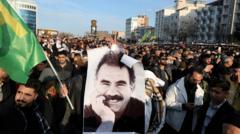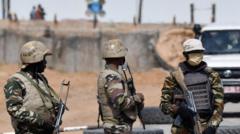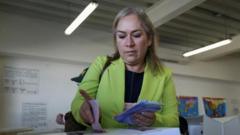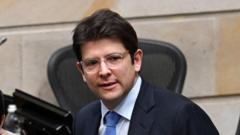In a significant development, the outlawed Kurdish group PKK has declared that it is disbanding and laying down its arms after four decades of armed conflict with Turkey. This decision closely follows a plea from their jailed leader Abdullah Ocalan, who suggested earlier this year that the group should cease its militant activities in favor of a democratic framework. Once driven by aspirations for an independent Kurdish state, the PKK has shifted its focus toward seeking greater rights and autonomy within Turkey.
Kurdish PKK Announces Disbandment in Historic Shift Towards Peace

Kurdish PKK Announces Disbandment in Historic Shift Towards Peace
The rebel group’s disarmament follows a call for democracy and autonomy from its imprisoned leader.
The PKK, labeled as a terrorist organization by Turkey, the EU, and the United States, has been engaged in a brutal conflict that has claimed over 40,000 lives. Ocalan, who has been imprisoned since 1999, urged his followers to embrace democracy as the path forward in a letter sent from his high-security location in the Sea of Marmara. The future implications of this disbandment remain uncertain, particularly regarding potential negotiations for Ocalan's release and increased political dialogue surrounding Kurdish rights.
This moment comes at a time when both sides may find incentives to reach a resolution: the PKK has experienced military setbacks, and Turkish President Erdogan is looking to appease pro-Kurdish factions ahead of the upcoming presidential elections in 2028. Erdogan's party has welcomed the disarmament, interpreting it as a move toward a "terror-free Turkey," but experts caution that substantial changes in Turkey's approach to democratic governance will be essential for genuine Kurdish political integration.
As the situation unfolds, observers note both opportunities and challenges ahead for all parties involved, with the next steps resting on Turkey's response to the Kurdish demands for inclusion and rights within its political framework.
This moment comes at a time when both sides may find incentives to reach a resolution: the PKK has experienced military setbacks, and Turkish President Erdogan is looking to appease pro-Kurdish factions ahead of the upcoming presidential elections in 2028. Erdogan's party has welcomed the disarmament, interpreting it as a move toward a "terror-free Turkey," but experts caution that substantial changes in Turkey's approach to democratic governance will be essential for genuine Kurdish political integration.
As the situation unfolds, observers note both opportunities and challenges ahead for all parties involved, with the next steps resting on Turkey's response to the Kurdish demands for inclusion and rights within its political framework.




















